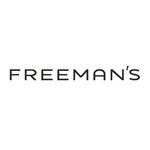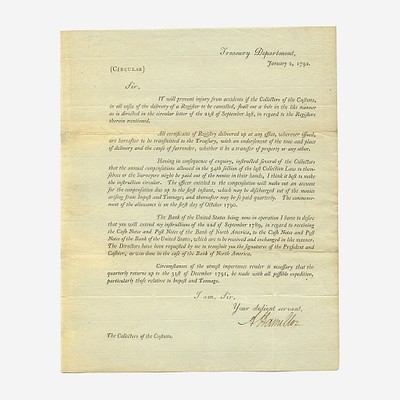[Hamilton, Alexander] [Report on Manufactures] Report of the Secretary of the Treasury on the Subject of Manufactures
About Seller
2400 Market St
Philadelphia, PA 19147
United States
Established in 1805, Freeman’s Auction House holds tradition close, with a progressive mind-set towards marketing and promotion, along with access to a team of top experts in the auction business. And now with offices in New England, the Southeast, and on the West Coast, it has never been easier to ...Read more
Two ways to bid:
- Leave a max absentee bid and the platform will bid on your behalf up to your maximum bid during the live auction.
- Bid live during the auction and your bids will be submitted real-time to the auctioneer.
Bid Increments
| Price | Bid Increment |
|---|---|
| $0 | $25 |
| $500 | $50 |
| $1,000 | $100 |
| $2,000 | $200 |
| $3,000 | $250 |
| $5,000 | $500 |
| $10,000 | $1,000 |
| $20,000 | $2,000 |
| $30,000 | $2,500 |
| $50,000 | $5,000 |
| $100,000 | $10,000 |
About Auction
Oct 25, 2021
Freeman's is honored to present The Alexander Hamilton Collection of John E. Herzog, a single-owner sale of Alexander Hamilton material, on October 25. Curated by Darren Winston, Head of the Books and Manuscripts Department. Freeman's info@freemansauction.com
- Lot Description
[Hamilton, Alexander] [Report on Manufactures] Report of the Secretary of the Treasury on the Subject of Manufactures
"To Correspondents. A review of several new publications, and sundry miscellaneous articles, are unavoidably postponed till next month, to make room for the report on manufactures. As this subject will shortly engage the attention of congress, and as copies of the report are not to be had, we have been induced to present it to our readers entire."
Philadelphia: Printed for the Proprietors, by William Young, 1792. Hamilton's classic report, Report of the Secretary of the Treasury on the Subject of Manufactures, printed on pp. 33-75 in the magazine, The Universal Asylum, and Columbian Magazine, for January, 1792. (ii), 33-79, (1) pp. (pp. 1-32 not present). Three-quarter tan calf, stamped in gilt, red morocco spine label, over marbled paper-covered boards; all edges trimmed; soiling to title-page, small loss at bottom corner of same; loss at top corner of pp. 33/34 affecting a few letters; scattered minor spotting to text. Howes H 123
One of the earliest public printings of Alexander Hamilton's famous Report on Manufactures, printed here in The Universal Asylum, and Columbian Magazine soon after Hamilton delivered his report to Congress on December 5, 1791. "Issued in December 1791, (the report) provided not only theoretical justifications for the promotion of domestic manufacturing, but as a policy document made specific proposals for government action. These proposals included higher import duties on certain final goods, lower import duties on certain raw materials, pecuniary bounties (production subsidies) for selected industries, and government assistance for the immigration of skilled workers, among other measures. To this day, the report is often heralded as the quintessential American statement against the laissez faire doctrine of free trade and for activist government policies�including protectionist tariffs�to promote industrialization." (Douglas A. Irwin, The Aftermath of Hamilton's "Report on Manufactures", The Journal of Economic History, Cambridge, Vol. 64, No. 3 [Sep., 2004] pp. 800-821). The report was met with criticism, especially from Thomas Jefferson, who viewed Hamilton's plan with alarm, as he thought it would disproportionately benefit Northerners at the expense of the Southern farmers he championed. Although the Report was rejected by Congress, his vision offered a modern forward-looking model toward national industrial development (see lot 18).
Howes refers to Hamilton's magnum opus as "One of the great American state papers, 'the Magna Carta of industrial America'"
- Shipping Info
-
No lot may be removed from Freeman’s premises until the buyer has paid in full the purchase price therefor including Buyer’s Premium or has satisfied such terms that Freeman’s, in its sole discretion, shall require. Subject to the foregoing, all Property shall be paid for and removed by the buyer at his/ her expense within ten (10) days of sale and, if not so removed, may be sold by Freeman’s, or sent by Freeman’s to a third-party storage facility, at the sole risk and charge of the buyer(s), and Freeman’s may prohibit the buyer from participating, directly or indirectly, as a bidder or buyer in any future sale or sales. In addition to other remedies available to Freeman’s by law, Freeman’s reserves the right to impose a late charge of 1.5% per month of the total purchase price on any balance remaining ten (10) days after the day of sale. If Property is not removed by the buyer within ten (10) days, a handling charge of 2% of the total purchase price per month from the tenth day after the sale until removal by the buyer shall be payable to Freeman’s by the buyer. Freeman’s will not be responsible for any loss, damage, theft, or otherwise responsible for any goods left in Freeman’s possession after ten (10) days. If the foregoing conditions or any applicable provisions of law are not complied with, in addition to other remedies available to Freeman’s and the Consignor (including without limitation the right to hold the buyer(s) liable for the bid price) Freeman’s, at its option, may either cancel the sale, retaining as liquidated damages all payments made by the buyer(s), or resell the property. In such event, the buyer(s) shall remain liable for any deficiency in the original purchase price and will also be responsible for all costs, including warehousing, the expense of the ultimate sale, and Freeman’s commission at its regular rates together with all related and incidental charges, including legal fees. Payment is a precondition to removal. Payment shall be by cash, certified check or similar bank draft, or any other method approved by Freeman’s. Checks will not be deemed to constitute payment until cleared. Any exceptions must be made upon Freeman’s written approval of credit prior to sale. In addition, a defaulting buyer will be deemed to have granted and assigned to Freeman’s, a continuing security interest of first priority in any property or money of, or owing to such buyer in Freeman’ possession, and Freeman’s may retain and apply such property or money as collateral security for the obligations due to Freeman’s. Freeman’s shall have all of the rights accorded a secured party under the Pennsylvania Uniform Commercial Code.
-
- Buyer's Premium



 EUR
EUR CAD
CAD AUD
AUD GBP
GBP MXN
MXN HKD
HKD CNY
CNY MYR
MYR SEK
SEK SGD
SGD CHF
CHF THB
THB![[Hamilton, Alexander] [Report on Manufactures] Report of the Secretary of the Treasury on the Subject of Manufactures](https://s1.img.bidsquare.com/item/l/9470/9470941.jpeg?t=1MwoER)
![[Hamilton, Alexander] [Report on Manufactures] Report of the Secretary of the Treasury on the Subject of Manufactures](https://s1.img.bidsquare.com/item/s/9470/9470941.jpeg?t=1MwoER)











